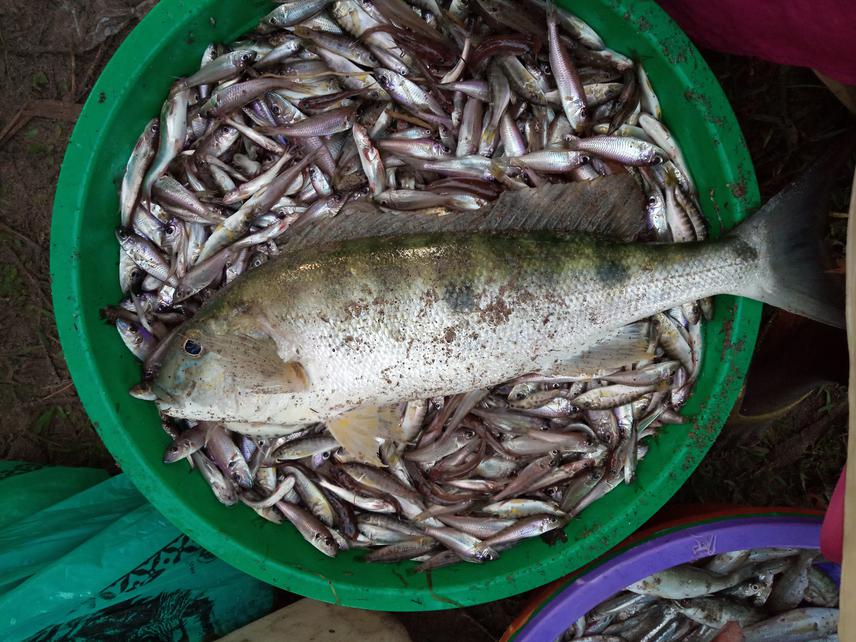Mushagalusa Cirhuza Deo
Other projects
6 Jul 2018
Ecological Evidences of Boulengerochromis microlepis (Cichlidae) Leading to Management Measures of Lake Tanganyika Littoral Cichlid Fishes (Congolese Side)
Lake Tanganyika hosts more than 315 littoral cichlids species of which approximately 98% are endemic. These species are strongly linked to a habitat-type throughout the littoral zones. However, there are currently many threats facing littoral-cichlids and their critical habitats often leading to population decreases, particularly for cichlid-species with economic interests. Previous figures from Lake Tanganyika north-western shores indicated intense littoral-fishing-activities, globally unsustainable on cichlid diversity, which is declining while studies on their ecology still fragmentary. Fishing-gears with small-sized-meshes and unsuitable fishing-techniques were common, mostly reporting smaller-sized fish, especially those of economic interests. Moreover, there is an increased lack of littoral-fishing regulations and conservation measures locally. Here, we seek to collect and disseminate ecological and socioeconomic data on common Lake Tanganyika littoral-cichlids in catches to strengthen conservation efforts. An overview on shoreline fishing-activities, species-richness and specific-threats will be provided and ways-forward given to encourage sustainable management measures at Lake Tanganyika.

A sample of mixed cichlid species caught by an encircling liftnet, including a large B. microlepis and its juveniles at Munene, Fizi
Lake Tanganyika littoral areas are of higher diversity, especially in cichlid teleost of unsurpassed speciation and economic values. However, these critical habitats and their fish-fauna are undergoing multiple alterations (e.g., overfishing, water pollutions, habitat-loss, sedimentation, and lake-global warming) often leading to species loss and local extinction. Along Congolese shorelines (depth 0–20 m) of high human influences and fish protein demands, many littoral-cichlid species are mostly targeted by local-fishers by employing different gears. Most of these fishing-gears and techniques are no longer sustainable to littoral-fish stock due mainly to their smaller mesh-sizes mostly capturing smaller-sized fish. Earlier data based-stock analysis reported a strong shortage of some cichlid species of commercial interests from many locations between Uvira and Fizi territories.
Cichlid species are particularly vulnerable to intense fishing further to their longevity and fecundity. Thus, such threat is not yet better illustrated due to the limited key ecological studies on each targeted littoral-fish species and habitat. Otherwise, fishery sector faces management problems (lack of conservation measures, low legislation, or uncontrolled rapid increase of fisher’s number), especially in Lake Tanganyika Congolese shores of Uvira and Fizi. Though actively intense, this littoral fishery still ignored in many aspects and many actors are unaware on threats arising from their activities to the fish resource. Detailed studies on these fishing-activities combined with fish ecology still limited; efforts to stimulate more insights into management and legislation initiatives are needed.
To manage fish resources, this project will examine the littoral fishing fleet from Lake Tanganyika north-western parts by collecting fish-data (experimental and commercial catch), environmental features and conducting socioeconomic surveys with education techniques in the field. We intend to investigate the littoral fishery of cichlids with more emphasis on their ecology (i.e., population status, reproduction, distribution, habitat requirements and fishery fleet status) of common species and to sensitize all stakeholders on the threats facing this resource in order to promote sustainable preservation of Lake Tanganyika littoral cichlid communities. The project findings will present high potential benefits for the communities, decision-makers, and future researches in term of biodiversity conservation at Lake Tanganyika, particularly in the Congolese side.